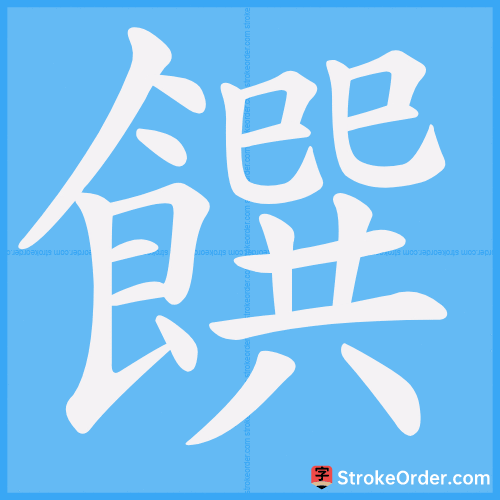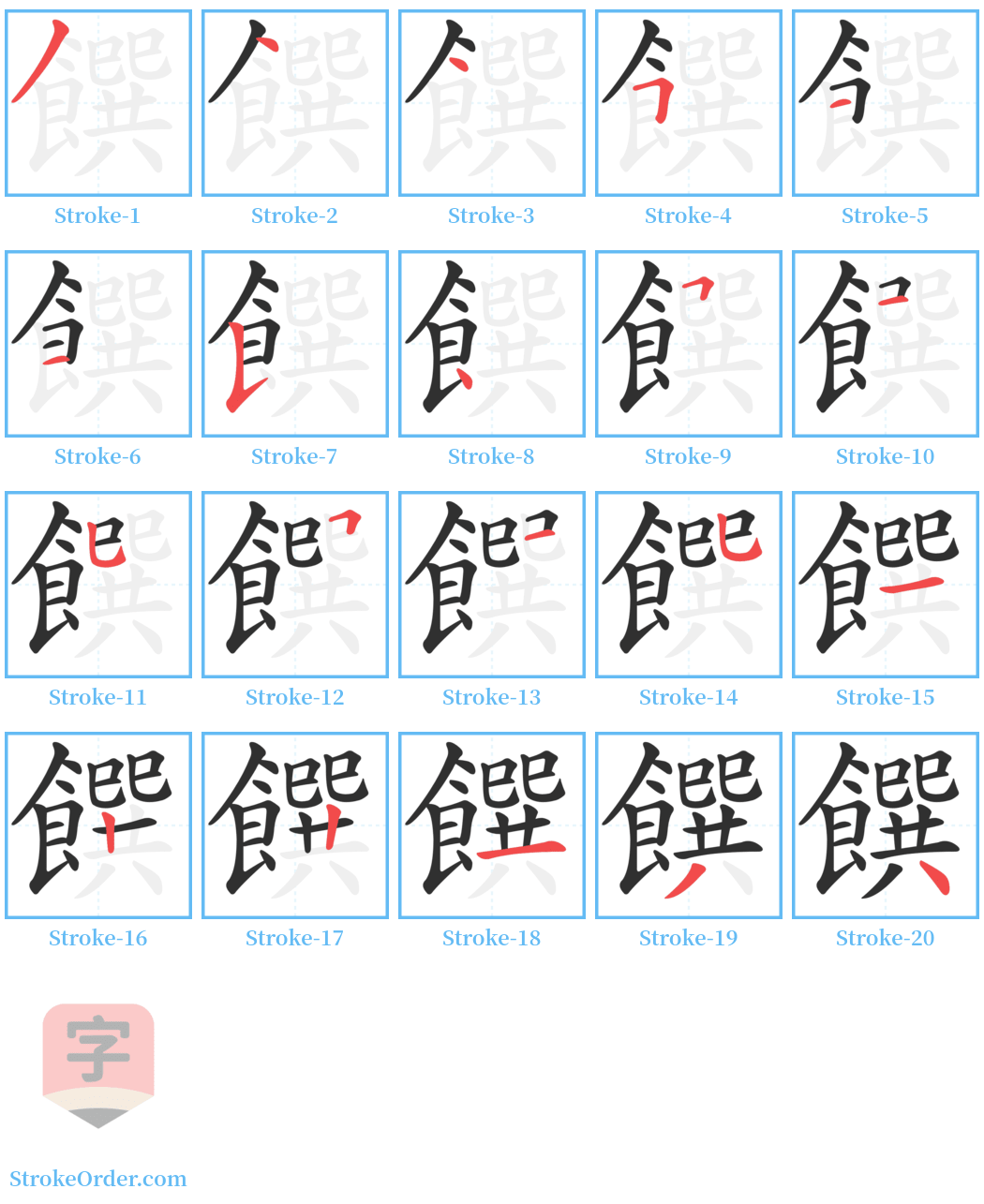饌 Stroke Order
Animated Stroke Order of 饌

Stroke Order Diagrams for 饌

Step-by-Step Handwriting Guide for 饌

Learn to Write Chinese Characters with Video Tutorials
Watch the video of writing the Chinese character "饌", learn the correct stroke order (笔顺) of the character "饌", and master the standard way of writing the character "饌".
Free Printable Handwriting Practice with Stroke Order: 饌
Printable Writing Practice Worksheet of "饌" in Portrait Orientation (Tian Zi Ge)

Printable Writing Practice Worksheet of "饌" in Landscape Orientation (Tian Zi Ge)

Information of 饌
Pinyin
zhuàn
Radical
飠
Strokes
20 strokes
Usage
★★★
Definition
food / delicacies
饌
1. Arrange food.
安排食物。
2. Meal; food.
饭食;食物。
3. Eating and drinking.
吃喝。
Detailed meanings:
1. Arrange food. In "Shuowen Jiezi • Food Section," it is noted that "饌 means to prepare food." In "Etiquette • Marriage Etiquette," it states, "Prepare food in the east." In "Qimin Yaoshu • Miscellaneous," it mentions, "On the sixth day, prepare and grind the five cereals, on the seventh day, start making the fermented food." In Tang poet Du Fu's "Post-Illness Meeting with Wang Yi," it states, "Send someone to the market to buy fragrant rice, call my wife to come out to prepare food herself."
2. Meal; food. In "Yupian • Food Section," it indicates "饌 means meal." In "Guangyun • Shan Rhyme," it is described as "饌, plate food." In "Etiquette • Feast Etiquette," it specifies, "The official prepares the meals in the east of the sleeping quarters." In Tang poet Li Bai's "Invitation to Wine," it states, "The sound of bells and drums, and jade dishes are not worth valuing, I just wish to remain drunk and not wake up." In "Rulin Waishi," the second chapter mentions, "Why does the master not use dishes today?"
3. Eating and drinking. In "Analects • Governance," it states, "If there is food and drink, the master partakes." Zhu Xi commented, "饌 refers to food and drink." In Tang poet Bai Juyi's "After Drinking and Joking with Disciples," it states, "The master provides wine and food, the disciples receive the labor." In Ming poet Kang Hai's "The Zhongshan Wolf," it mentions, "Almost dangerously bothered the master with food!" Additionally, it implies hospitality. In Tang monk Xuanzang's "The Great Tang Records on the Western Regions • Kingdom of Kapilavastu," it mentions, "Using worldly flavor to serve the monk." In Song scholar Shen Kuo's "Dream Brook Notes • The Marvelous," it recounts, "Master Ru suddenly wrote a letter to Wen Zheng, also instructing on future matters, Wen Zheng was extremely puzzled. At that time, he was entertaining guests, and the chief scribe Zhu Yan was in the room. Yan, an elder, loved Buddhism, Wen Zheng showed Yan the letter from Master Ru." In Qing poet Zheng Zhen's "Poem of the Old Man by the River," it mentions, "Stopping by the road, I reminisce about that time, the host served me, I did not accept money."
Verb: To prepare and arrange food. Tang poet Du Fu's "Post-Illness Meeting with Wang Yi" states: "Send someone to the market to buy fragrant rice, call my wife to come out to prepare the food herself."
Verb: To eat and drink. "Analects • Governance" states: "If there is food and drink, the master partakes."
1. It is the same as "鍰." An ancient weight unit. Six taels of gold is considered a 饌.
通“鍰”。古重量单位。以金六两为馔。
2. "饌" refers to a precious item. In "Zihui Supplement • Food Section," it is described: "饌 refers to valuable shells." In "Shuowen • Metal Section," it clarifies: "鍰, is a type of money." Qing scholar Duan Yucai commented: "In ancient texts, 'Shangshu • Lü Xing' is written as '鍰', while modern 'Shangshu' writes it as '率', also written as '選', or '饌'." In "Shangshu Dazhuan • Fu Xing," it states, "The Xia Hou Clan neither killed nor punished, for serious crimes they would impose a fine of two thousand 饌." The rule of the ruler Yao over his people also did not punish the strong, leading to governance. One 饌 equals six taels.
通“鍰”。古重量单位。以金六两为馔。《字彙補•食部》:“饌,貨貝名。”《説文•金部》“鍰,鋝也”清段玉裁注:“古文《尚書•吕刑》作‘鍰’,今文《尚書》作‘率’,亦作選,或作饌。”《尚書大傳•甫刑》:“夏后氏不殺不刑,死罪罰二千饌。”又禹之君民也,罰弗及强而天下治。一饌六兩。”